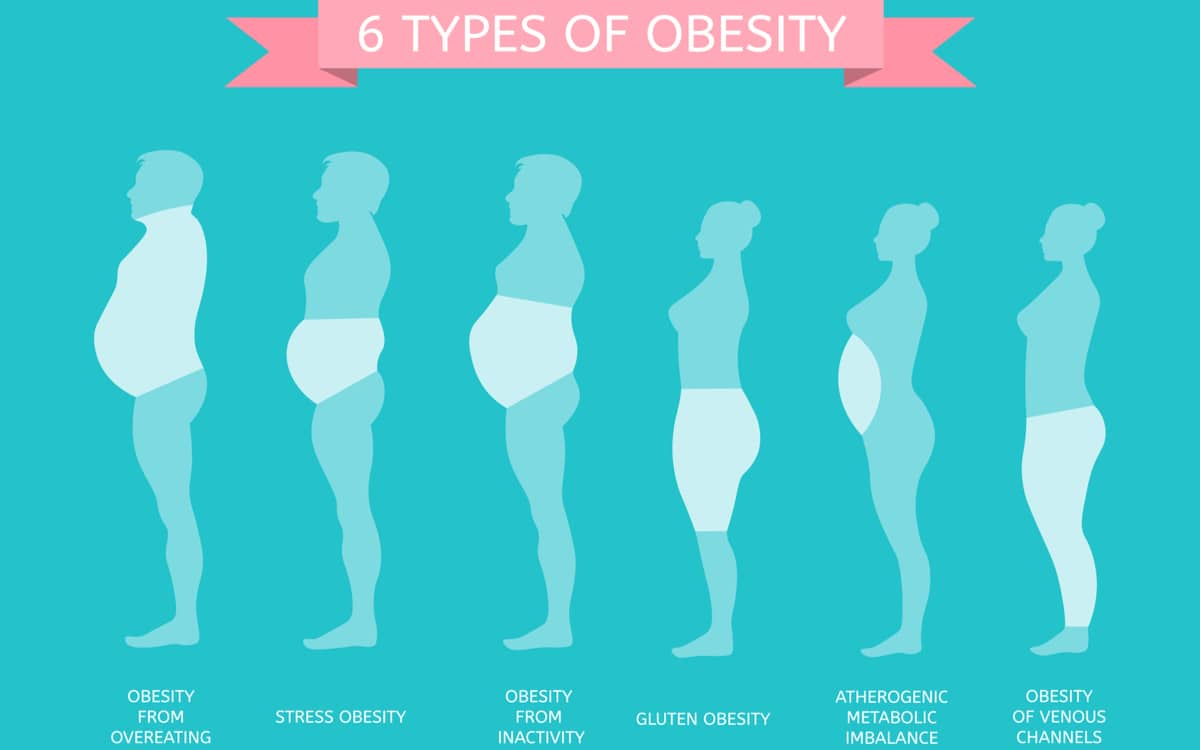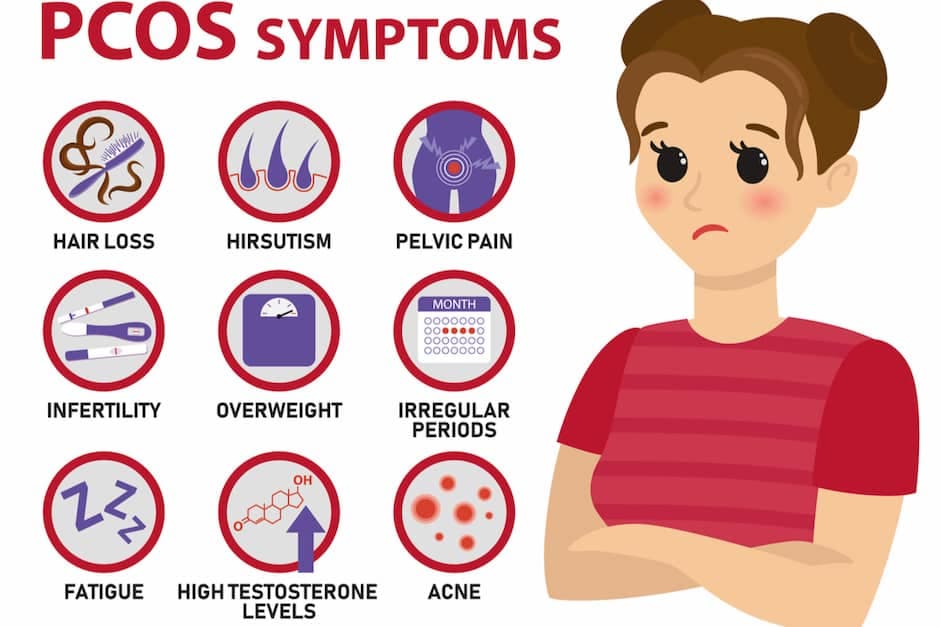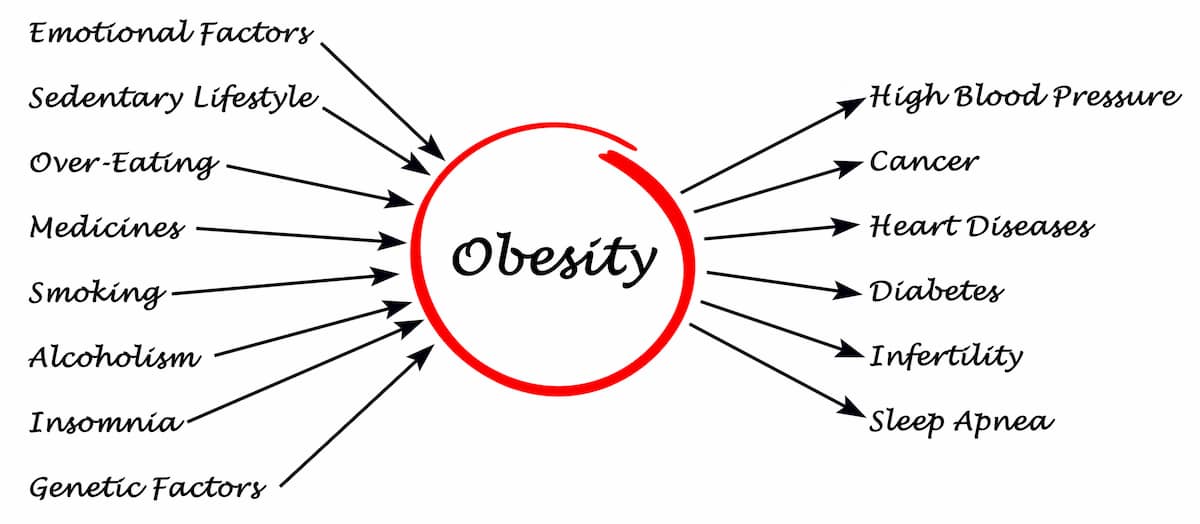The accumulation of abnormal or excessive fat is known as obesity, and according to The World Health Organization (WHO), it can be harmful to health. Obesity is a chronic disease, with multifactorial origin, of high prevalence, which is associated with an increased risk of developing cardiovascular diseases, a decrease in the quality of life, and an increase in mortality.
Types of Obesity

The international classification of obesity in adults is proposed by the WHO and based on the Body Mass Index (BMI). People who have a BMI equal to or greater than 30 kg / m2 (the same for both sexes) are obese. BMI can measure obesity. The calculation is made by dividing the weight (kg) by the square of the height in meters. For example, if a woman or man weighs 120 kilos and is 1.65 meters tall, their BMI is 44 (120 kg / 1.65 x 1.65 = 44). BMI has shown a correlation between body fat (not its distribution) and health risk at the population level.
Obesity is also classified according to the distribution of adipose tissue in:
- Abdominal and visceral obesity. Also called the android type with a predominance of adiposity in the upper half of the body: neck, shoulders, and abdomen. This type of obesity is associated with an increased risk of metabolic diseases (type 2 diabetes, atherosclerosis, etc.).
- Femoral gluteal or gynoid obesity. With a predominance of adiposity in the buttocks, hips, thighs, and the lower half of the body.
Causes

Some diseases can be responsible for obesity. Although they should always be ruled out before considering that obesity is of unknown cause, they are present in a very small part of all obese patients. Among them are:
Metabolic disorders:
- Hypothyroidism.
- Cushing’s Syndrome.
- Polycystic Ovary Syndrome.
- Insulinoma.
Brain disorders that affect the hypothalamus (appetite-regulating center):
- Craniopharyngioma.
- Some antipsychotics.
- Lithium.
- Some antiepileptic drugs.
- Some antidepressants.
- Taking medications. Medications that can promote weight gain are antidiabetics, corticosteroids, insulin, and some oral diabetes medications may also increase weight.
Other Factors

In most cases, however, obesity is not due to any other disease, and its causes are unknown, although always derived from a combination of genetic and environmental factors:
Genetic Factors: There is no doubt that in obesity, there are genetic factors that favor it. It is common for overweight parents to have overweight children. This has been shown, for example, by studying adopted children. The weight of adopted children is more similar to that of their biological parents than that of adoptive parents. There are probably a great many genes that contribute to a tendency to inherit weight, although most of them have yet to be identified. It is currently estimated that genetic factors explain half, or slightly more than half, of excess weight. Although some cases have been described, the presence of specific genetic mutations associated with obesity is very rare. In general, they are cases of very severe obesity, present since childhood and associated with other abnormalities, such as mental retardation.
Environmental factors: The environmental factors that influence weight are:
- Feeding: Both the type of food and quantity.
- Physical activity performed: both at work and recreationally.
- Sleep deprivation: which is associated with the development of obesity.
The environmental factors interact with the genetic inheritance received from our biological parents so that the development of obesity is facilitated or not. Other factors that contribute to obesity are:
- Age: The older a person becomes, the easier it is to gain weight, probably because muscle mass is lost, and the basal energy expenditure (the calories burned daily) is lower.
- Sex: Women have a lower basal energy expenditure than men, so they burn less fat. This is especially important at the beginning of menopause, where it is common to gain weight despite still doing the same activity as before.
- Psychological factors: Many people find their eating behavior is affected by their mood. Anxiety, sadness, and boredom can influence our eating habits, leading to an increased calorie intake.
In general, the weight has been considered as a balance between the calories that a person consumes (what they eat) and those that they expend (their basal energy expenditure and their physical activity). While this relationship holds in many circumstances, it is not true for all patients
Consequences

After smoking, obesity has become the second cause of avoidable mortality, with many diseases associated with it: type 2 diabetes mellitus, high blood pressure, ischemic heart disease, sleep apnea, osteoarthritis, etc. It is even related to the increased risk of some types of cancer, and it is estimated that in the case of morbid obesity, it can reduce life expectancy by between 6 and 14 years.
Fat accumulation under the diaphragm and on the chest wall can also put pressure on the lungs, causing shortness of breath and choking, even with minimal exertion. On the other hand, it can cause various orthopedic problems, including pain in the lower back area and aggravation of osteoarthritis, especially in the hips, knees, and ankles.
Skin disorders are, likewise, particularly common in people with obesity. Since obese people have a small body surface area for their weight, they cannot remove heat from the body efficiently, so they sweat more. On the other hand, as a consequence of the prejudices and discrimination that people with obesity often suffer, it is frequent that psychological disorders and low self-esteem are associated with this problem.
How to Treat Obesity

- Diet changes: reducing calories and having healthy eating habits are essential to overcome obesity. In this case, we should avoid drastic and unrealistic diets such as blitz diets. The comprehensive weight-loss stage will last at least six months, and the maintenance stage one year.
- Exercise and physical activity: increasing physical activity is essential to treat obesity. Most people who manage to lose weight and maintain it for at least a year tend to exercise in some form regularly, even if it is just walking.
- Changes in behavior: A behavior modification program can help the patient make lifestyle changes to lose weight and keep the weight off.
If you find these measures do not work, you may choose to perform weight loss surgery, also known as bariatric surgery. In this case, there is a limitation of the amount of food that can be eaten, decreasing the absorption of food and calories.

